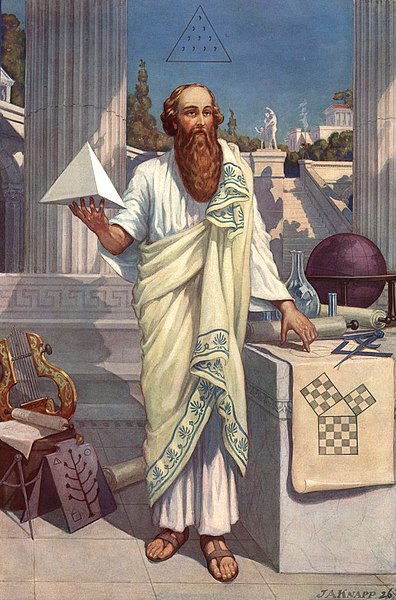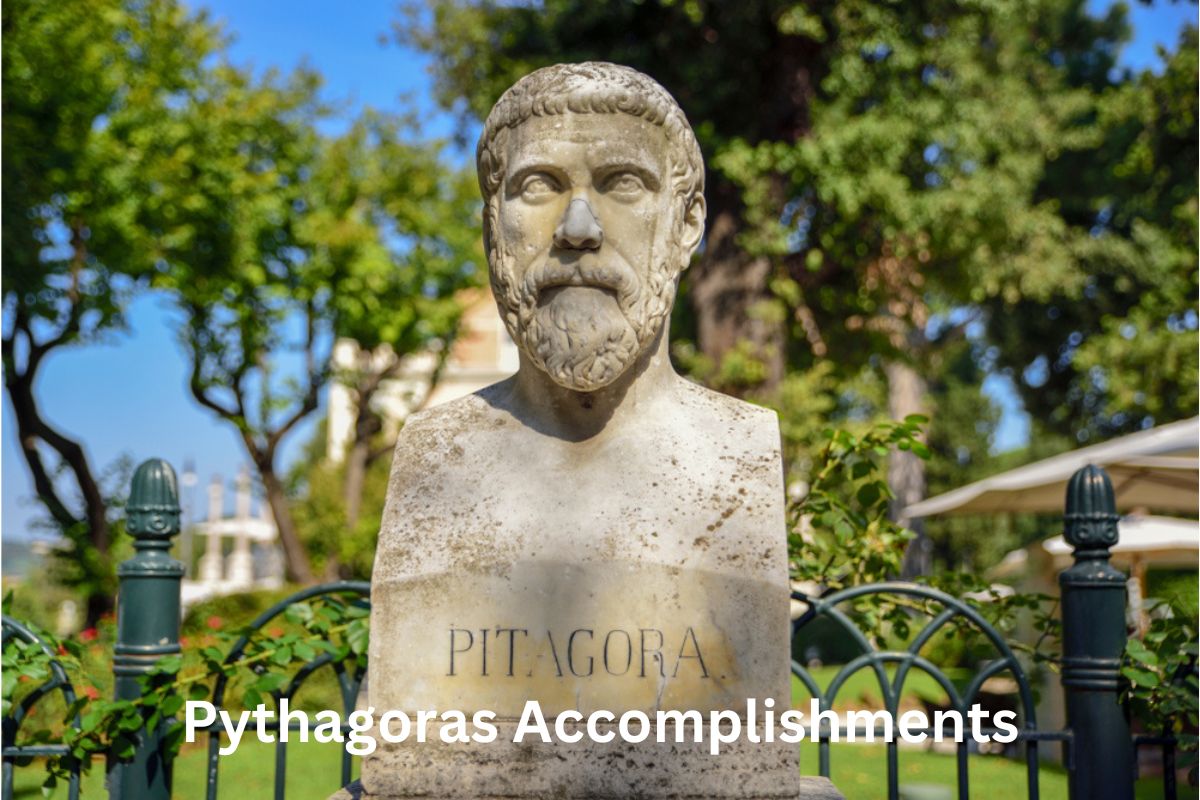Pythagoras was an ancient Greek mathematician, philosopher, and founder of the Pythagorean School. Born around 570 BCE on the island of Samos, he is best known for his eponymous theorem, which established the relationship between the sides of a right-angled triangle.
Pythagoras made significant contributions to various fields, including mathematics, geometry, music theory, and philosophy.
He discovered irrational numbers, developed mathematical proofs, and explored geometric proportions such as the golden ratio. Pythagoras founded the Pythagorean Brotherhood, a secretive community dedicated to intellectual pursuits, ethical living, and the pursuit of wisdom.
His teachings influenced subsequent generations of mathematicians, philosophers, and scientists, shaping Western thought and intellectual development.
While much of Pythagoras’ life is shrouded in myth and legend, his contributions and ideas have left an enduring legacy in the realms of mathematics, philosophy, and music.
Accomplishments of Pythagoras
1. Pythagorean Theorem
Pythagoras is best known for the Pythagorean Theorem, which states that in a right-angled triangle, the square of the length of the hypotenuse is equal to the sum of the squares of the lengths of the other two sides.
Also Read: Facts About Pythagoras
This theorem has profound implications in geometry and has been used extensively in various fields such as architecture, engineering, and physics. It provides a fundamental relationship between the sides of a right triangle and has practical applications in measuring distances, calculating angles, and solving geometric problems.

2. Discovering irrational numbers
Pythagoras and his followers made a groundbreaking discovery in mathematics by realizing the existence of irrational numbers. They encountered the square root of 2, a number that cannot be expressed as a fraction or a ratio of integers.
This challenged the Pythagorean belief in the harmony and order of the universe, as it contradicted their notion that all numbers could be expressed as ratios of whole numbers.
The discovery of irrational numbers revolutionized the understanding of numbers and laid the foundation for further developments in mathematics.
3. Mathematical proofs
Pythagoras and the Pythagorean School were pioneers in developing the concept of mathematical proof. They sought to establish rigorous logical reasoning and demonstrated theorems through deductive reasoning.
Pythagoras emphasized the importance of providing sound and irrefutable arguments to support mathematical propositions. The idea of proof was a significant departure from earlier mathematical traditions, which relied more on empirical observations.
This approach to mathematical reasoning laid the groundwork for the development of formal mathematics and influenced subsequent generations of mathematicians.
4. Golden ratio and geometric proportions
Pythagoras and his followers were fascinated by the inherent mathematical harmony and beauty found in geometric proportions. They explored the concept of the golden ratio, a mathematical ratio approximately equal to 1.618, which is considered aesthetically pleasing.
The golden ratio appears in various geometric constructions, such as the division of a line segment or the proportions of rectangles.
Pythagoras recognized the significance of these proportions in art, architecture, and nature, and believed that they reflected underlying mathematical principles that governed the universe.

5. Mathematical relationships in music
Pythagoras observed a profound connection between mathematics and music. He discovered that musical intervals, such as octaves, fifths, and fourths, could be expressed as simple numerical ratios.
This led to the development of the Pythagorean tuning system, a method of tuning musical instruments based on these ratios. The understanding of these mathematical relationships in music had a lasting impact on the theory and practice of music.
It laid the foundation for concepts like harmonics, scales, and intervals that are still used today.
6. Cosmological model centered around Earth
Pythagoras and his followers developed a cosmological model that placed Earth at the center of the universe. They believed that the Earth, as a perfect sphere, was surrounded by concentric celestial spheres that contained the planets, stars, and other celestial bodies.
Pythagoras and his followers also proposed that these celestial bodies emitted sounds or “harmonies,” which collectively created a “harmony of the spheres.” This concept reflected their belief in the interconnection between mathematics, music, and the cosmos.
While this model was later replaced by the heliocentric model of the universe, it laid the groundwork for future astronomical and cosmological investigations.
7. Founding Pythagoreanism, a philosophical and religious school
Pythagoras established the Pythagorean School, also known as Pythagoreanism, in Croton, Magna Graecia (southern Italy).
The school was a community of followers who were dedicated to philosophical and religious teachings. Pythagoreanism emphasized the pursuit of wisdom, the importance of ethical living, and the belief in the transmigration of souls.
The school operated as a secret society, with members adhering to strict rules, communal living, and intellectual pursuits. Pythagoreanism had a significant influence on subsequent philosophical schools, including Plato’s Academy.
8. Numerology and mystical interpretations of numbers
Pythagoras and his followers attributed mystical and divine qualities to numbers. They believed that numbers held a deep significance and were the key to understanding the nature of the universe and the human soul.
Pythagoreans assigned specific meanings and characteristics to numbers, leading to the development of numerology. They explored the symbolic and mystical interpretations of numbers, associating them with various metaphysical concepts and cosmic principles.
9. Establishing the Pythagorean Brotherhood
Pythagoras established the Pythagorean Brotherhood, a community of like-minded individuals dedicated to intellectual pursuits, spiritual development, and communal living. The Brotherhood was based on principles of friendship, equality, and mutual respect.
Members of the Brotherhood engaged in a range of activities, including studying mathematics, philosophy, music, and science. The establishment of this community fostered an environment of intellectual exchange and collective exploration of knowledge.
10. Influence on Western thought and intellectual development
Pythagoras’ ideas and teachings had a profound and lasting impact on Western thought and intellectual development. His emphasis on rational inquiry, mathematical reasoning, and the interplay between numbers and the natural world laid the foundation for scientific thinking.
Pythagorean concepts, such as the Pythagorean Theorem and the mathematical relationships in music, became fundamental pillars of mathematics and science. Pythagoras’ philosophical and ethical teachings influenced subsequent philosophers, such as Plato and Aristotle, and shaped the development of Western philosophy.
The legacy of Pythagoras can be seen in the fields of mathematics, philosophy, music theory, and even in the broader cultural and intellectual landscape of Western civilization.
